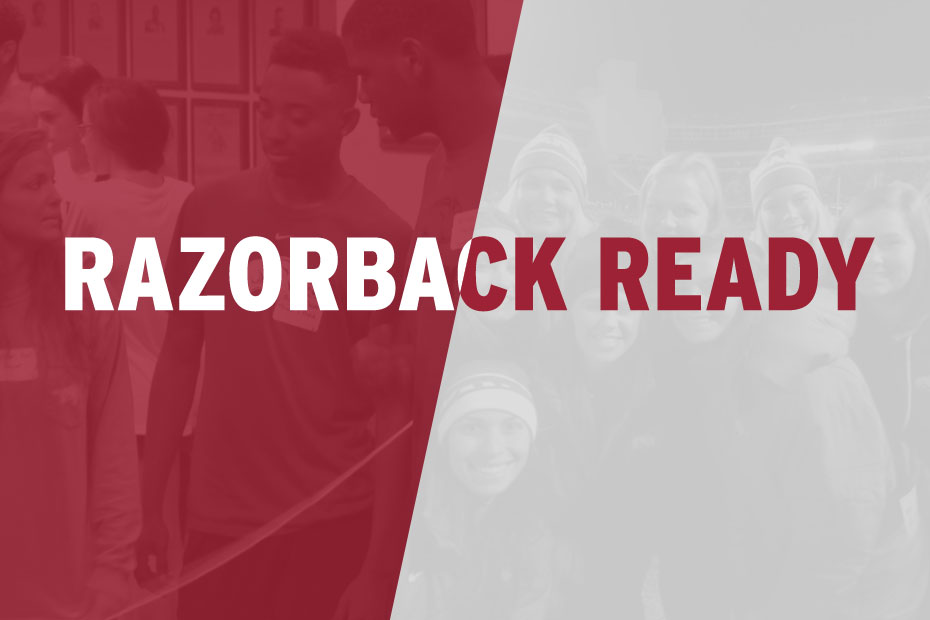
OSAS Works With Millennials and Generation Y’s
FAYETTEVILLE, Ark. – Universities around the country are striving to meet the changing needs of student-athletes and the Arkansas Razorbacks’ Office of Student-Athlete Success (OSAS) has taken innovative approaches to current events by creating programming that directly addresses hot topics and the changing landscape of college athletics.
This article is the third in a five part series titled The Changing Landscape of College Athletics: Meeting the Needs of our Razorbacks that will highlight those efforts and the unique learning opportunities. The articles will focus on the education and instruction that will benefit the next generation of young professionals on the following subjects:
– June 12: Financial literacy
– June 22: Career education and job attainment
– Working with the Millennials and Generation Y
– The role of our Student-Athlete Advisory Committee (SAAC)
-Social spotting to help address risky behaviors
The Razorback Office of Student-Athlete Success (OSAS) is dedicated to empowering our student-athletes by providing the support resources to help them achieve success while in college and for life beyond. The effectiveness of our programming is highly dependent on being able to engage our student-athletes in meaningful and transformative experiences. As a result, the student-athlete development staff, academic counselors and Educational Enrichment Services (EES) explore ways to continuously relate and connect with the Millennials and Generation Y student-athletes. The second half this generation of students were born in the early 1990s. While our student-athletes are diverse and have a range of backgrounds and experiences, they also exhibit many common characteristics.
“For me, it’s easier to relate because I played football and ran track here, so I feel especially connected with those student-athletes,” said Richard Smith, a learning specialist at Arkansas. “At times, this generation may seem to have an entitled attitude, but once you breakthrough their shell by showing that you are personally investing in them as people, they open up to you. I try and add that personal touch with an open door policy and them trusting me with the real stuff; that what is said in my office will stay in my office”
One of those characteristics is the influx and evolution of technology and how it has impacted current student-athletes and the ways in which they communicate, process and internalize information. Student-athletes are web-savvy and able process high volumes of information in short periods of time. Consequently, they also have preferences related to ways of receiving information. The student-athlete development staff incorporated technology to help reinforce topics covered during in person workshops.
One such example is the use of the mobile app Mobile Learner. Junior and senior Razorbacks receive weekly career tips that help reinforce concepts covered in the career workshops related to interviewing, networking, dress etiquette and dining etiquette. The tips are sent to their phones through the mobile app in preparation for the student-athlete career symposium conducted at the end of the fall and spring semesters.
Similarly, freshmen and sophomore student-athletes receive reminders related to strategies for avoiding risky behaviors before weekends. These reminders are featured on the Mobile Learner app and aligned with information covered in the social spotting program. Likewise, members of the Razorback Leadership Academy receive videos and challenges to promote and practice leaderships skills covered during their in person meetings.
The student-athlete development staff is also conscious of the potential dangers related to dependence on technology. In particular, programming is tailored to highlight the importance of networking in person and developing verbal communication skills for interviews. There is an emphasis on utilizing technology such as LinkedIn as a tool to start relationships, but often meeting in person and being able to communicate verbally is essential to building, cultivating sustaining meaningful relationships. Additionally, social issues related to misuse of video and photos are addressed in programming.
Many characteristics of the Millennials make service learning a viable tool for development. Often, Millennials have big ideas about making a positive impact socially. Technology has made this generation more connected with issues outside of their home region and internationally.
Additionally, our student-athletes have either directly or indirectly experienced a multitude of national and international tragedies that raise awareness about a range of social issues. As result, students are aware and conscious of social issues related to police and community relations nationally, poverty and sexual assault.
Service learning is used as a tool to engage Razorback student-athletes. Often, they are interested in having an impact socially. It is also an opportunity to educate student-athletes on social issues and promote personal reflection. The student-athlete development staff makes a concerted effort to align learning objectives with the community service initiatives. The learning objectives are related to self-awareness, practical skills but also demonstrate experiences that can be documented on resumes. Each service learning experience has the potential to shape the student-athletes attitudes, beliefs and promote competency development.
While there is a need to cater to this generation of student-athletes based on their preferences, there are also efforts made to prepare to student-athletes to enter a professional world that is managed by older generations. As a result, career development classes and workshops incorporate topics that address potential generational gaps. For example, the student-athletes may be accustom to instant gratification and quick results that are spurred from the internet, the use of microwaves and other forms of technology. However, there may be situations where longer processes and strategic approaches are necessary to be successful. Razorback student-athletes are encouraged to build on the skill of multitasking but there are also discussions about the importance of being able to concentrate on single projects and following through to completion when necessary in the working world. Similar to the necessity of building professional relationships through networking in person and developing strong verbal and written communication skills to obtain a job, career development programming is used to of emphasize the importance utilizing interpersonal skills to advance professionally.
For more information on Arkansas Athletics, follow @ArkRazorbacks and @HogLife_Scholar on Twitter.
